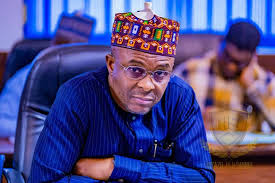The Managing Director of the Nigerian Ports Authority (NPA), Dr. Abubakar Dantsoho, is gaining praise for reforms that are transforming the agency and aligning it with the Federal Government’s economic goals, especially in trade facilitation and port competitiveness.
Since his appointment by President Bola Ahmed Tinubu ten months ago, Dantsoho has pursued sweeping reforms across Nigeria’s maritime sector. His first actions focused on improving efficiency, cutting administrative overheads, blocking revenue leakages, and increasing debt recovery. Stakeholders say these steps are yielding visible results.
Licensed customs agent, Mr. Ikenna Johnpaul, said Dantsoho’s leadership style is both professional and proactive. “From the start, he promised to make Nigerian ports the most efficient in Africa. And he’s doing that. Debt collection has improved significantly and many leakages have been blocked,” he said.
Dantsoho, who rose through the ranks in NPA, is being credited with revamping the agency’s revenue generation capacity. Under his watch, NPA’s revenue surged from ₦424.2 billion in 2023 to ₦893.6 billion in 2024 — a 111% increase that has surprised many in the maritime industry.
Maritime analyst Mezie Kingsley said Dantsoho’s achievements have not gone unnoticed. “He was named Man of the Year by The Reporters Nigeria Magazine and has also been honoured by Vanguard and BusinessDay for trade facilitation and port efficiency,” he said.
Kingsley added that Dantsoho led Nigeria into full membership of the International Port Community Systems Association, helping the country implement the National Single Window for trade transparency. “Under his leadership, transshipment activities at Lekki Deep Seaport have increased, supporting hinterland and landlocked areas. He also became the first Nigerian elected as President of the Port Management Association of West and Central Africa, showing how much faith other countries have in him.”
Dantsoho has vowed to support Nigeria’s export drive and is working closely with major stakeholders, including Nigeria LNG. During a recent meeting with the CEO of Nigeria LNG Limited, Dr. Philip Mshelbila, he said NPA would support efforts to grow non-oil exports.
He stressed that Nigeria’s ports must be ready to compete in the African Continental Free Trade Area (AfCFTA), predicting a rise in intra-African trade. “Our vision is to make Nigeria the maritime logistics hub for sustainable port services in Africa,” he said.
Industry expert John Agbave supported this vision, stressing that port competitiveness is linked to strong institutions, good infrastructure, and macroeconomic stability. He said port costs play a key role in determining the final price of goods, making it important for Nigerian ports to remain efficient.
Dantsoho is currently overseeing a massive port modernisation plan, targeting dilapidated infrastructure at the Apapa and Tin Can Island Ports. “These ports suffer from collapsed breakwaters and weak quay aprons. Our plan is to start with these two and later extend the modernisation to others,” he said.
In terms of technology, NPA is working with the International Maritime Organisation to implement the Port Community System and National Single Window, which will reduce paperwork and streamline payments.
The Presidential Enabling Business Environment Council (PEBEC) also launched the Ports and Customs Efficiency Committee in collaboration with NPA. Speaking at the launch, PEBEC DG Zahrah Mustapha said the initiative will reduce cargo dwell time and improve the ease of doing business.
Despite these positive developments, challenges remain. High port charges have made Nigerian ports less competitive compared to others in the region. In March, Chairperson of the Shipping Association of Nigeria (SAN), Mrs. Boma Alabi, said some Nigerian port charges are ten times higher than those in Ghana or Togo. She warned that this is pushing cargo to neighbouring countries.
Shipping expert Emma Anyabu said full automation of port operations requires strong infrastructure. “Modern container cranes can’t be deployed without strong quay aprons. This is why port modernisation is urgent. It can reduce vessel turnaround from days to hours,” he said.
